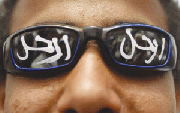
|
| An anti-government protester is carried by fellow protesters as he shouts slogans during a rally to demand the ouster of Yemen’s President Ali Abdullah Saleh outside Sanaa University March 7, 2011. Dancing in circles with decorative daggers, tribesmen seem a festive addition to anti-government rallies in Sanaa. But to some, they signal the potential for Yemen protests to split the country apart. At Sanaa University, thousands of people who have joined protests camp out together nightly, but they are no unified front: activists in jeans and t-shirts eye the tribesmen in white robes and colourful sashes sitting in separate tents. REUTERS/Khaled Abdullah |
Activists in the southern city of Taiz said police opened fire on pro-democracy protesters on Thursday, leaving many wounded.
Meanwhile, at least 20 people were injured in the capital, Sanaa, as security forces reportedly fired live bullets and tear gas at thousands of anti-government protesters camping outside a university.
The incidents came a day after at least 120 people were wounded in renewed clashes between pro- and anti-government protesters in the port city of al-Hudayah.
Ten protesters were shot, and dozens were stabbed and hit with rocks, a medical official told the Associated Press news agency.
Weeks of protests
Yemen, the Arabian Peninsula state neighboring oil giant Saudi Arabia, has been hit by weeks of protests set in motion by uprisings in North Africa that have toppled long-serving leaders in Tunisia and Egypt and have spread to the Gulf states of Bahrain, Oman and Saudi Arabia.
Saleh has maintained a firm grip on power for 32 years and has scoffed at calls to step down, saying he will only do so when his current term of office expires in 2013.
His offer of a unity government to the opposition was rebuffed recently as protesters vowed to press ahead with demonstrations until Saleh quits.
Scores of people have died in clashes with security forces in the southern port city of Aden and in the capital, which is the focal point of the demonstrations.
Yemen’s rial has fallen up to almost 8 per cent against the dollar in the past week as unrest takes a toll on the poor Arab country’s economy, traders said late on Wednesday.
The central bank has slapped unspecified penalties on 10 currency exchanges and other firms for dealing in dollars above the official rate of about 214 rials.
Calls for dialogue
The United States, which has long seen Saleh as a bulwark against an active al-Qaeda wing based in Yemen, has condemned the bloodshed and backed the right to peaceful protest.
But it has also insisted only dialogue can end the political crisis, although Saleh recently blamed Israel and Washington for being behind unrest sweeping North African and the Gulf states.
Amid the protests came reports of the arrest of suspected al-Qaeda members.
The government website September 26 said three fighters suspected of links to al-Qaeda were killed when they tried to attack a military checkpoint on Thursday in Marib province.
“Yemen’s security services arrested Kahled Saeed Baterfi and Amer al-Lahji at a security checkpoint in Taiz,” a security official said.






Leave a Reply